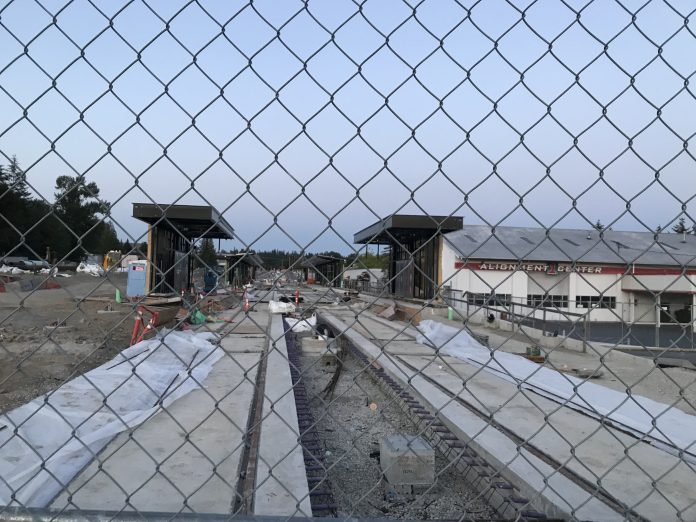Sound Transit will welcome a new senior executive next month. Terri Mestas, an experienced infrastructure manager, has been tapped for a new lead megaproject expert role to right the agency’s sprawling capital expansion programs.
Mestas will serve as Deputy CEO of Megaproject Delivery with responsibility in managing projects from start to finish. That will give her direct oversight of multiple departments and teams, ranging from planning and design to operations and construction management, with an eye toward improving decision-making and effectively advancing projects. Consequently, if Mestas is successful in the role, she should help reduce project timelines and save the agency a significant amount of money in capital expenditures.

In late 2022, the Sound Transit Board of Directors ad-hoc Technical Advisory Group (TAG) — a panel of industry experts — called for the agency to hire a megaproject expert to manage and expedite Sound Transit’s 30-year, $74.9 billion portfolio of transit expansion projects. That call was reiterated last March when the TAG issued a formal report consisting of six key recommendations with an expert megaproject management team being the second most important action.
“The organization must build on the foundation of the current structure and scale up beyond current capacity and expertise if it is going to deliver [Sound Transit 3], including hiring additional experienced executive leaders who have successfully led similarly large and complex programs elsewhere,” the March 2023 report said. “The TAG recommends hiring a new Executive Director of Capital Programs and two new deputies, to oversee [Sound Transit 2] and [Sound Transit 3], from outside the agency.”
Chair of the TAG, Grace Crunican, told the board of directors that hiring megaproject experts was paramount and would come at a cost. “You’re going to have to hire a recruiter to do it and you’re going to have to pay them more probably than you pay the CEO,” Crunican said. “We’re telling you this now so that people aren’t shocked that that’s what’s ahead of you.”
Crunican likened the hires to how universities pay football coaches more than university presidents, a reflection of how talent closer to the team and marshaling it to success can be more difficult and costly to attain than senior administrators with broader and less specific tasks.
Nevertheless, Sound Transit had been slow to act on the TAG recommendation, failing to begin the recruitment process until late last year. That seems in part due to top management who charted an alternative paradigm last spring to place a single megaproject expert under then Deputy CEO Brooke Belman and hiring consultants to carry out aspects of deputy megaproject expert positions recommended by the TAG instead of hiring for the roles. That didn’t go over well with the agency governing board, forcing top management to move forward with recruitment and a reporting structure as intended by the TAG.
With recruitment still dragging on in the fall, the TAG was diplomatic in its assessment of how Sound Transit was addressing their recommendations, but fundamentally said that the agency lacked a culture of urgency. Ken Johnsen, a TAG member, specifically expressed disappointment in the long timeframe in hiring a megaproject expert lead. “It looks like that position is going to be filled well over a year from when we recommended it with a high degree of urgency to you,” he said.
On Wednesday, Crunican expressed confidence in Mestas as a hire. “Sound Transit’s capital program needs a strong leader who understands and can manage complex, multibillion dollar programs,” Crunican said in a statement. “TAG members were part of the selection process and believe Ms. Mestas is the right choice to deliver this program.”

With over 30 years of experience, Mestas boasts roles in infrastructure delivery for space exploration, military facilities, aviation, antiterrorism security, and higher education research facilities.
In her latest role, Mestas has served as Chief Development Officer, a management role at Los Angeles World Airports (LAWA), to oversee the public agency’s $30 billion capital improvement program, primarily reshaping Los Angeles International Airport (LAX).
As the world’s eighth busiest and country’s four busiest airport, LAX is undergoing major changes with reconstruction of three terminals, expansion of its midfield international satellite concourse, construction of a new rental car facility for 21,000 vehicles, and build out of a new automated people mover (APM) that will connect with a planned Los Angeles Metro Rail station opening later this year — though the $2 billion, 2.3-mile APM has been mired in delays with a fresh one announced on Friday. With the 2028 Summer Olympics coming to Los Angeles, there is a lot of pressure to complete projects.
Prior to LAWA, Mestas worked at the California Institute of Technology in a senior management role for capital project design and construction, overseeing development of state-of-the-art research facilities. And before that, Mestas had a long stint at AECOM, a multinational infrastructure consulting firm, serving in numerous roles over a 15-year period to support public and private clients’ projects. One of those roles was leading a master planning and capital improvement program at NASA’s Ames Research Center, which is part of Moffett Federal Airfield, a joint civil-military airport, in Silicon Valley.
In terms of education, Mestas primarily studied at Catholic University of America, a higher education institution in Washington, D.C, and holds a Bachelor of Science in Architecture from the university’s School of Architecture and Planning.
Weeks ahead of her start date, Mestas joined Thursday’s Sound Transit Board of Directors meeting to briefly introduce herself. “I am looking forward to working with you, the Sound Transit team, the community, and all the stakeholders that are vital to the success and the implementation of this vital, critical capital program,” Mestas said. “I’m ready to take the opportunity and responsibility and I’m confident that working together with the team that we’re going to achieve new levels of success.”
Mestas will be paid a hefty sum of $600,000 per year, a reflection of the expertise level desired for the role and competition for seasoned professionals across the infrastructure industry. Unlike the agency’s interim CEO who is appointed, Mestas will be considered a regular employee and therefore will work at-will, eliminating the need for an employment contract by the agency governing board and allowing the agency flexibility in replacing Mestas should the need arise.
The advertised salary range for Mestas’ role was $350,000 to $550,000 per year, but the position also comes with numerous benefits like health insurance and retirement contributions. In contrast, interim CEO Goran Sparrman is receiving a base annual salary of $385,000 making Mestas much better compensated, though bonuses could add $59,000 to Sparrman’s salary if he remains on the job for a whole year.
But unlike her soon-to-be boss, Mestas will have a narrower but highly important set of tasks to overhaul the agency’s capital expansion program. The TAG envisions a wholesale culture change in how the agency does business and intends to see megaproject experts “empowered and expected to give clear yes or no to changes during the planning stages and subsequently empower other staff to lead consultants effectively during the design stage.”
Sound Transit hired a specialized executive recruitment firm, Krauthamer and Associates, last year to carry out a national search for someone like Mestas. That search, however, isn’t exactly cheap with Krauthamer scoring a $600,000 contract. As a three-year contract though, Sound Transit may be able to exercise it for additional recruitment efforts.
Mestas will start work in her new role on April 29, just two days after the 2 Line opens on the Eastside as an abbreviated service. In time, the agency expects to hire two deputies to serve under Mestas with respective oversight of the Sound Transit 2 and Sound Transit 3 capital programs.
For now, the Sound Transit Board of Directors seem satisfied with the hire of Mestas. Many prominent boardmembers offered glowing reviews of Mestas this week and excitement that critical change could be on the way. “With her background as a leader of large, complex infrastructure programs, Ms. Mestas brings the depth of experience and expertise that the agency needs to set the nation’s largest capital expansion project on a fresh path to success,” Sound Transit Board Chair and King County Executive Dow Constantine said.
Stephen is a professional urban planner in Puget Sound with a passion for sustainable, livable, and diverse cities. He is especially interested in how policies, regulations, and programs can promote positive outcomes for communities. With stints in great cities like Bellingham and Cork, Stephen currently lives in Seattle. He primarily covers land use and transportation issues and has been with The Urbanist since 2014.



